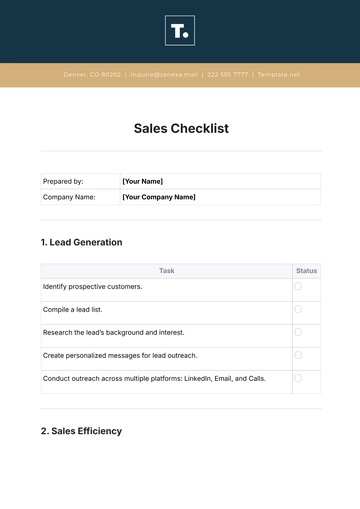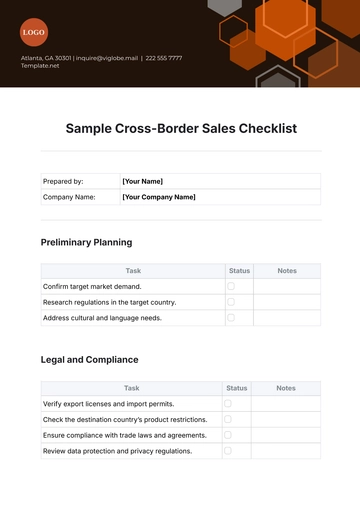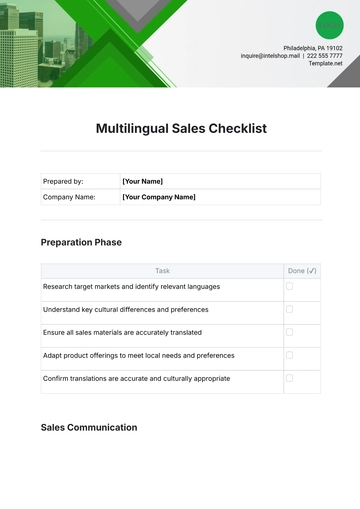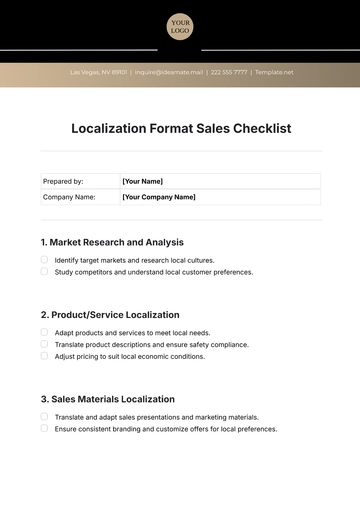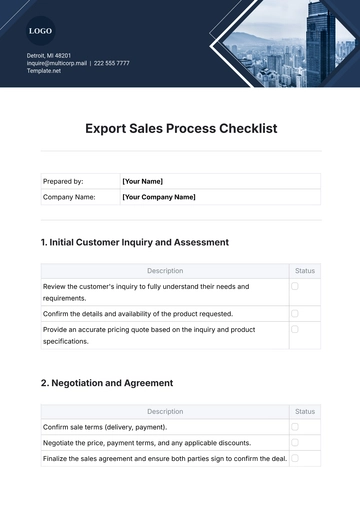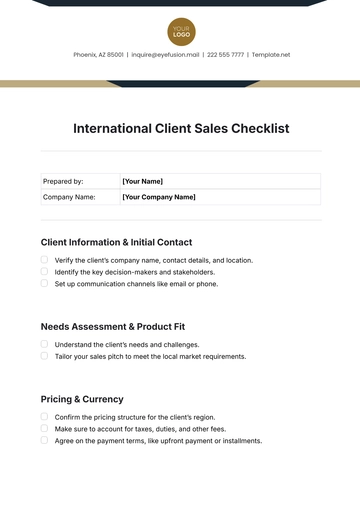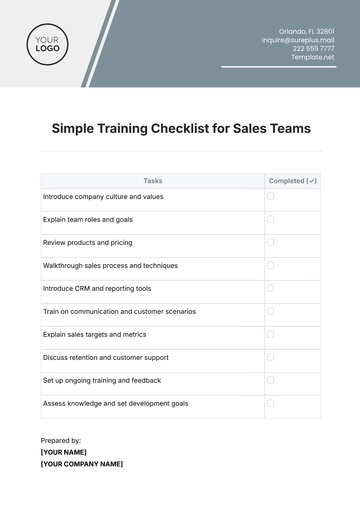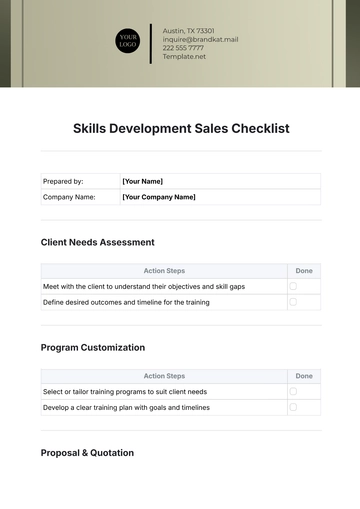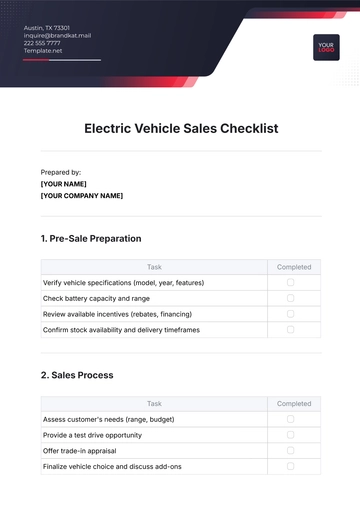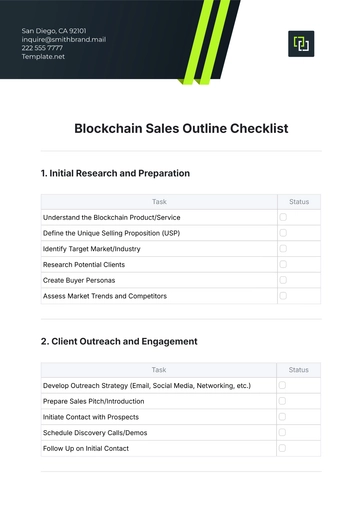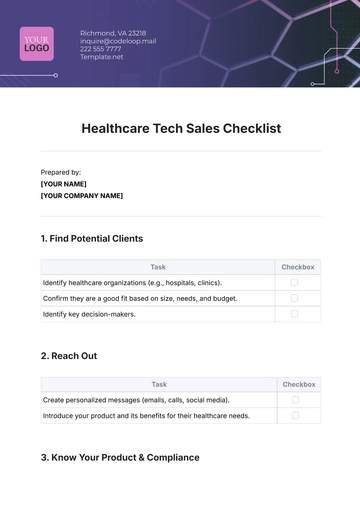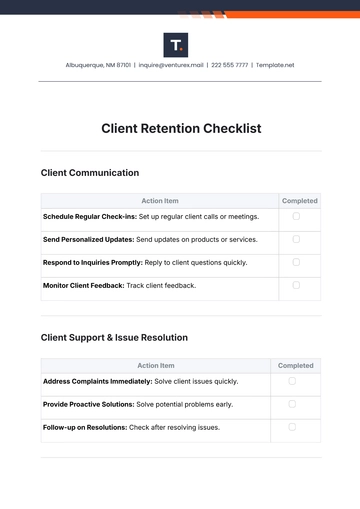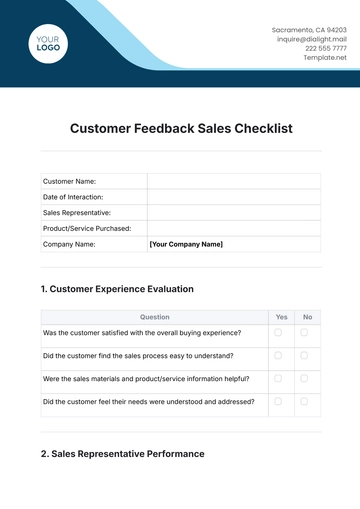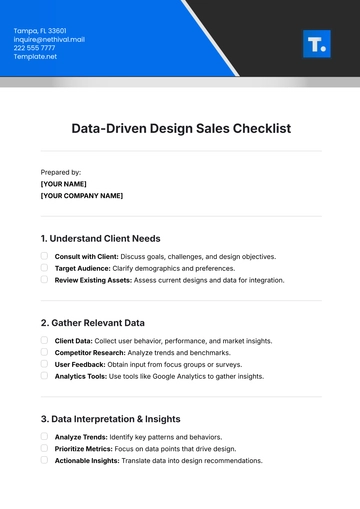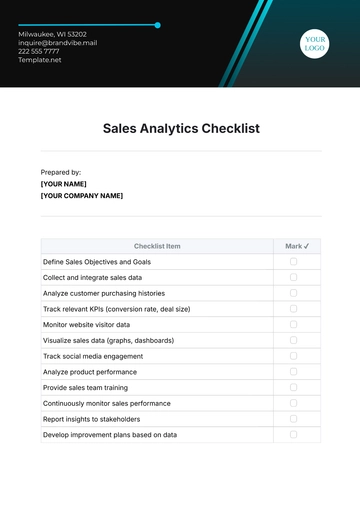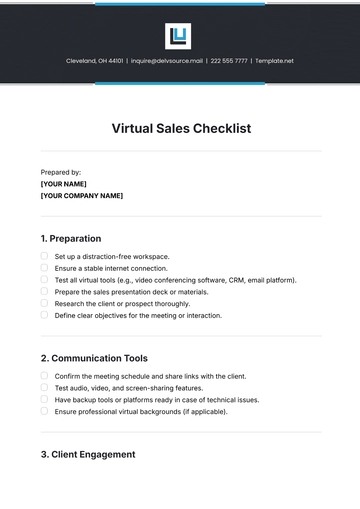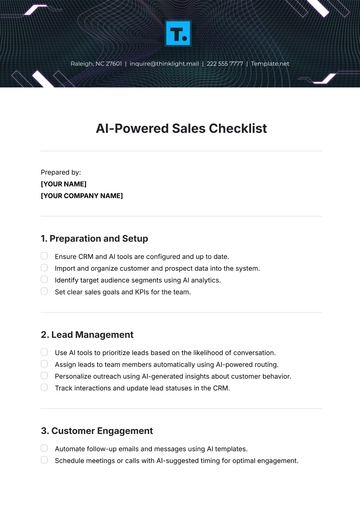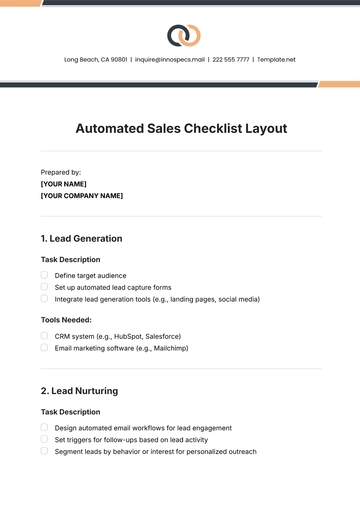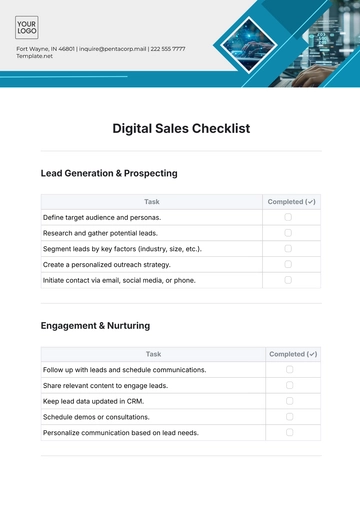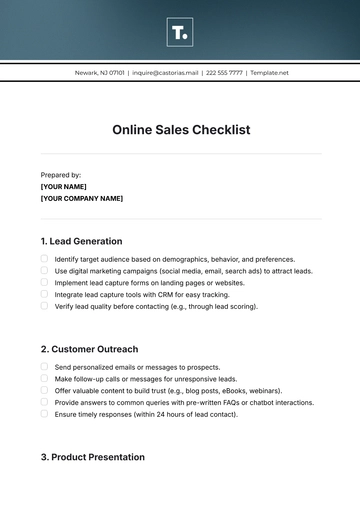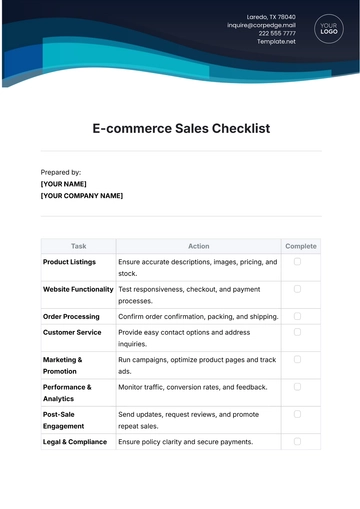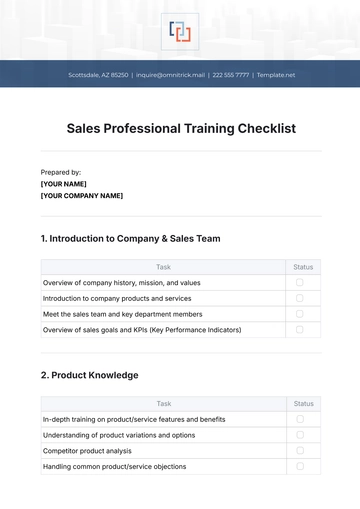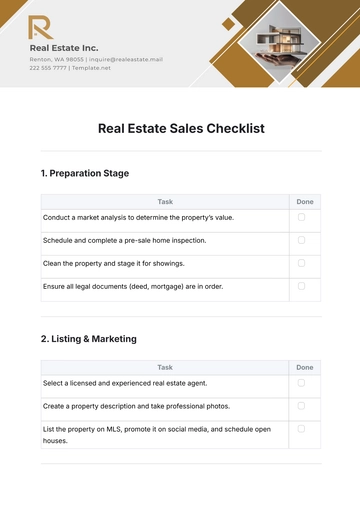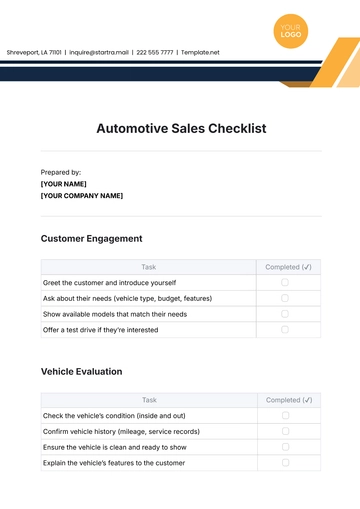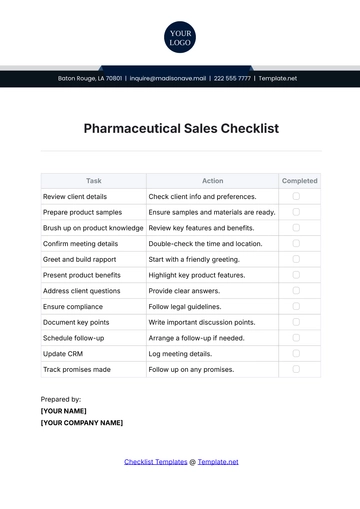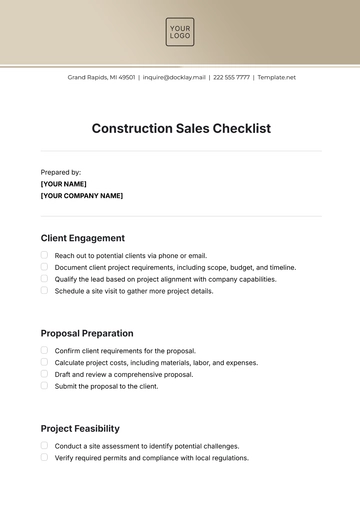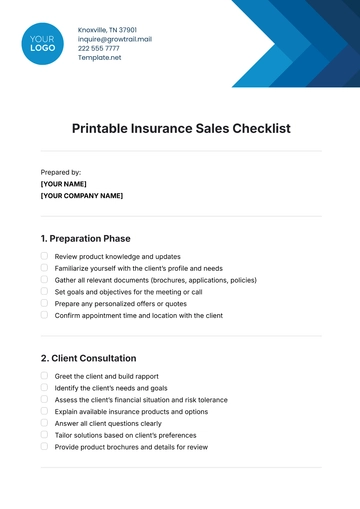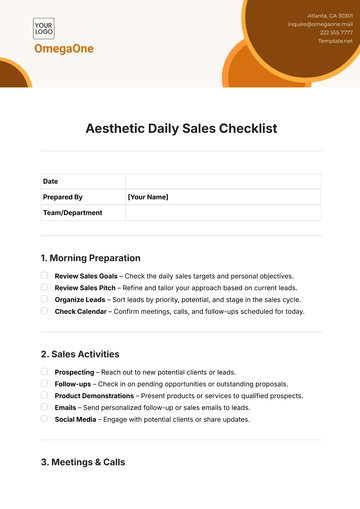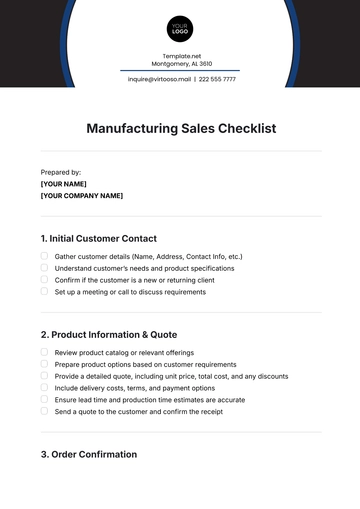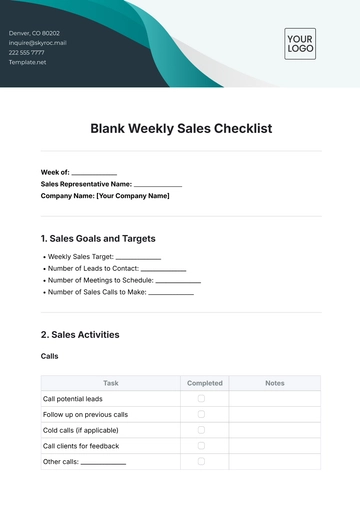Free Sales Training Checklist Printable
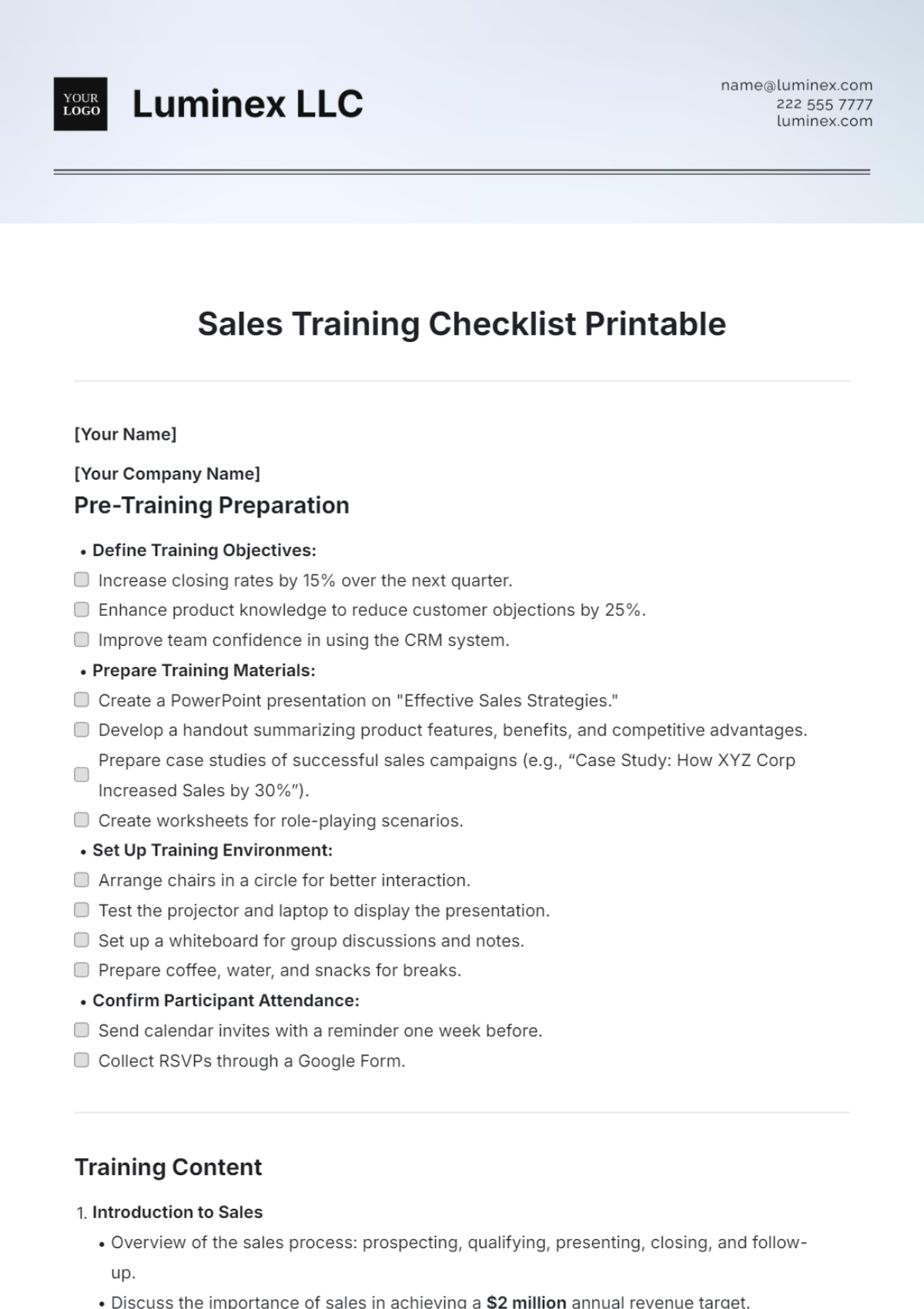
[Your Name]
[Your Company Name]
Pre-Training Preparation
Define Training Objectives:
Increase closing rates by 15% over the next quarter.
Enhance product knowledge to reduce customer objections by 25%.
Improve team confidence in using the CRM system.
Prepare Training Materials:
Create a PowerPoint presentation on "Effective Sales Strategies."
Develop a handout summarizing product features, benefits, and competitive advantages.
Prepare case studies of successful sales campaigns (e.g., “Case Study: How XYZ Corp Increased Sales by 30%”).
Create worksheets for role-playing scenarios.
Set Up Training Environment:
Arrange chairs in a circle for better interaction.
Test the projector and laptop to display the presentation.
Set up a whiteboard for group discussions and notes.
Prepare coffee, water, and snacks for breaks.
Confirm Participant Attendance:
Send calendar invites with a reminder one week before.
Collect RSVPs through a Google Form.
Training Content
Introduction to Sales
Overview of the sales process: prospecting, qualifying, presenting, closing, and follow-up.
Discuss the importance of sales in achieving a $2 million annual revenue target.
Introduce company mission and values: “Customer-Centric Approach.”
Product Knowledge
Detailed breakdown of our top three products:
Product A: Features, benefits, and target demographics.
Product B: Unique selling propositions and customer testimonials.
Product C: Price comparisons and ROI for clients.
Sales Techniques
Prospecting Strategies:
Identify target markets: Small to mid-sized businesses in technology and retail sectors.
Discuss methods for lead generation, including LinkedIn outreach and networking events (e.g., local Chamber of Commerce meetings).
Building Rapport:
Role-play scenarios to practice effective communication and relationship-building techniques (e.g., “How to Introduce Yourself to a Prospect”).
Active listening exercises: Pair up and practice summarizing what the other person says.
Sales Presentation Skills:
Structure of a compelling sales pitch: Opening, problem identification, solution presentation, and call to action.
Practice engaging storytelling techniques: Use a case study to illustrate a successful client story.
Closing Techniques:
Review various closing strategies:
Assumptive Close: “When would you like to get started?”
Urgency Close: “This promotion ends Friday; can we secure your order today?”
Customer Relationship Management (CRM)
Overview of SalesForce: Importance of CRM in tracking leads and sales.
Best practices for inputting and tracking customer data: Record all customer interactions, set reminders for follow-ups.
Post-Training Activities
Schedule Follow-Up Sessions:
Plan monthly check-in meetings to assess progress.
Assign mentors within the team for ongoing support.
Distribute Training Feedback Forms:
Use Google Forms to collect feedback on the training session.
Analyze feedback to assess effectiveness: Aim for at least 80% satisfaction rate.
Evaluate Training Effectiveness:
Monitor closing rates and customer feedback over the next three months.
Set individual and team goals based on feedback and performance metrics.
Create Action Plans:
Encourage participants to outline three actionable steps to apply learned skills.
Schedule one-on-one sessions with each team member to discuss personal goals.
- 100% Customizable, free editor
- Access 1 Million+ Templates, photo’s & graphics
- Download or share as a template
- Click and replace photos, graphics, text, backgrounds
- Resize, crop, AI write & more
- Access advanced editor
Boost your sales team’s effectiveness with our Sales Training Checklist Printable Template from Template.net. This editable and customizable template makes tracking essential sales training elements easy. Print and adjust as needed, or modify it digitally using our editable in our Ai Editor Tool for seamless integration.
You may also like
- Cleaning Checklist
- Daily Checklist
- Travel Checklist
- Self Care Checklist
- Risk Assessment Checklist
- Onboarding Checklist
- Quality Checklist
- Compliance Checklist
- Audit Checklist
- Registry Checklist
- HR Checklist
- Restaurant Checklist
- Checklist Layout
- Creative Checklist
- Sales Checklist
- Construction Checklist
- Task Checklist
- Professional Checklist
- Hotel Checklist
- Employee Checklist
- Moving Checklist
- Marketing Checklist
- Accounting Checklist
- Camping Checklist
- Packing Checklist
- Real Estate Checklist
- Cleaning Checklist Service
- New Employee Checklist
- Food Checklist
- Home Inspection Checklist
- Advertising Checklist
- Event Checklist
- SEO Checklist
- Assessment Checklist
- Inspection Checklist
- Baby Registry Checklist
- Induction Checklist
- Employee Training Checklist
- Medical Checklist
- Safety Checklist
- Site Checklist
- Job Checklist
- Service Checklist
- Nanny Checklist
- Building Checklist
- Work Checklist
- Office Checklist
- Training Checklist
- Website Checklist
- IT and Software Checklist
- Performance Checklist
- Project Checklist
- Startup Checklist
- Education Checklist
- Home Checklist
- School Checklist
- Maintenance Checklist
- Planning Checklist
- Manager Checklist
- Wedding Checklist
- Vehicle Checklist
- Travel Agency Checklist
- Vehicle Inspection Checklist
- Interior Design Checklist
- Backpacking Checklist
- Business Checklist
- Legal Checklist
- Nursing Home Checklist
- Weekly Checklist
- Recruitment Checklist
- Salon Checklist
- Baby Checklist
- Equipment Checklist
- Trade Show Checklist
- Party Checklist
- Hospital Bag Checklist
- Evaluation Checklist
- Agency Checklist
- First Apartment Checklist
- Hiring Checklist
- Opening Checklist
- Small Business Checklist
- Rental Checklist
- College Dorm Checklist
- New Puppy Checklist
- University Checklist
- Building Maintenance Checklist
- Work From Home Checklist
- Student Checklist
- Application Checklist
